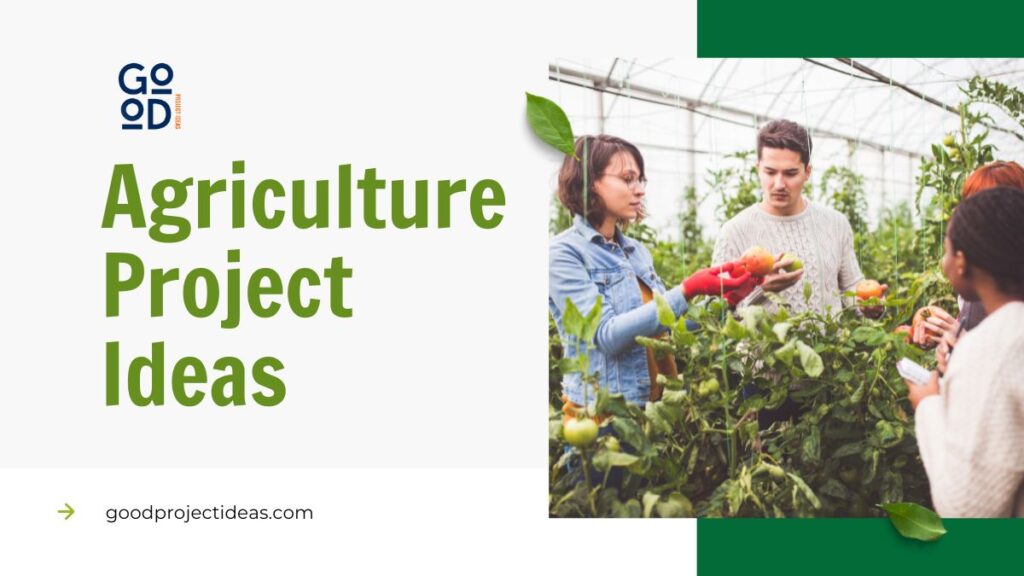Let’s explore some cool agriculture project ideas! Whether you’re into sustainable farming, new farming gadgets, or how weather changes affect crops, there’s a lot to discover. These projects are not just interesting—they also help solve real problems.
Hey there, ready to explore the world of agriculture? Whether you’re into biology, technology, or just love plants, agriculture has something cool for you. From starting your mini-farm to trying out new farming tech, there’s so much to discover. Join us on a journey through these fun agriculture project ideas. Let’s plant the seeds of innovation and grow a greener future together!
The Importance of Agriculture Projects
Agricultural projects are super important for food, money, and the environment. Here’s why they’re a big deal:
- Food Security: They help make more food and better food, which is great for health.
- Economic Growth: These projects create jobs and make countryside areas better with schools and roads.
- Poverty Reduction: By giving farmers more money, they can help themselves and their communities.
- Environmental Sustainability: They use smart ways to protect nature, like saving water and using fewer chemicals.
In short, these projects are key to making sure we have enough food, make money, and protect our planet.
Agriculture Project Ideas
Have a close look at agriculture project ideas:
Crop Production
- Test new crop varieties for higher yields.
- Implement precision agriculture techniques.
- Study organic farming methods.
- Explore hydroponic farming.
- Research effects of fertilizers on crops.
- Investigate benefits of cover crops.
- Study impact of climate change on crops.
- Develop sustainable weed management.
- Implement crop rotation practices.
- Explore vertical farming methods.
Livestock Farming
- Improve animal welfare practices.
- Study probiotics in animal feed.
- Investigate feeding regimes for livestock.
- Implement sustainable grazing management.
- Research alternative protein sources.
- Develop disease-resistant livestock breeds.
- Study technology for monitoring animal health.
- Implement biosecurity measures.
- Explore benefits of mixed farming.
- Study impacts of climate change on livestock.
Agricultural Technology
- Develop farm management app.
- Design soil moisture sensor network.
- Create drone-based crop monitoring.
- Study blockchain technology in agriculture.
- Develop smart irrigation systems.
- Study AI in pest management.
- Design low-cost greenhouse.
- Develop solar-powered water pumping.
- Implement GPS-guided tractors.
- Explore 3D printing in agriculture.
Soil Management
- Study tillage practices on soil health.
- Implement soil conservation plan.
- Investigate biochar as soil amendment.
- Develop composting program.
- Study benefits of no-till farming.
- Implement soil erosion control.
- Research cover crops for soil fertility.
- Study soil microbes in agriculture.
- Develop soil testing kit.
- Study climate change impacts on soil.
Water Management
- Implement rainwater harvesting.
- Study irrigation methods for water use.
- Develop water recycling system.
- Investigate drip irrigation.
- Implement water conservation plan.
- Research climate change impacts on water.
- Study greywater use in agriculture.
- Explore desalination for irrigation.
- Develop water quality monitoring.
- Study water pollution impacts on crops.
Agroforestry
- Implement agroforestry systems.
- Study benefits of integrating trees.
- Research agroforestry impact on biodiversity.
- Develop tree planting program.
- Investigate agroforestry for climate change.
- Study agroforestry effects on soil.
- Explore economic benefits of agroforestry.
- Implement sustainable agroforestry.
- Research cultural significance of agroforestry.
- Study agroforestry effects on water.
Food Security
- Implement community garden project.
- Study food waste impact on security.
- Develop food distribution program.
- Investigate urban agriculture for security.
- Study climate change impact on security.
- Implement school feeding program.
- Research benefits of traditional crops.
- Develop food storage program.
- Study food price impact on security.
- Explore technology for food access.
Sustainable Agriculture
- Implement sustainable farming certification.
- Study agroecology benefits.
- Develop sustainable agriculture policy.
- Investigate renewable energy in agriculture.
- Implement zero-waste farming.
- Research sustainable agriculture and biodiversity.
- Study effects on rural communities.
- Explore economic benefits.
- Develop sustainable agriculture training.
- Study effects on soil health.
Agricultural Education and Outreach
- Implement farm-to-school program.
- Study impact of agri-education on youth.
- Develop agricultural extension program.
- Investigate social media in agri-outreach.
- Implement farm tourism.
- Research benefits for women.
- Study effects on urban communities.
- Explore storytelling in agri-outreach.
- Develop school gardening.
- Study impact on sustainable practices.
Climate Change Adaptation
- Implement climate-smart agriculture.
- Study agroforestry for adaptation.
- Develop climate-resilient crops.
- Investigate water-saving techniques.
- Implement climate-resilient livestock.
- Research climate change and pests.
- Study effects on crop yields.
- Explore weather forecasting.
- Develop climate change strategy.
- Study diversifying crops for adaptation.
Rural Development
- Implement rural electrification.
- Study rural infrastructure impact.
- Develop rural entrepreneurship.
- Investigate microfinance in development.
- Implement rural health care.
- Research promoting rural tourism.
- Study effects of rural migration.
- Explore ICTs in rural development.
- Develop rural education.
- Study impact of land tenure.
Pest and Disease Management
- Implement integrated pest management.
- Study benefits of crop rotation.
- Develop biocontrol for pests.
- Investigate pheromones in pest control.
- Implement disease surveillance.
- Research climate change and pests.
- Study pesticide impact on pollinators.
- Explore natural enemies for pest control.
- Develop pest and disease forecasting.
- Study cultural practices for management.
Organic Farming
- Implement organic certification.
- Study benefits for soil health.
- Develop organic fertilizer production.
- Investigate biopesticides.
- Implement crop rotation for organics.
- Research impact on biodiversity.
- Study effects on water quality.
- Explore composting.
- Develop organic farming training.
- Study benefits for human health.
Aquaculture
- Implement sustainable aquaculture.
- Study aquaculture impact on water.
- Develop fish breeding program.
- Investigate recirculating aquaculture.
- Implement fish health management.
- Research integrating aquaculture.
- Study effects of climate change.
- Explore aquaponics.
- Develop aquaculture extension.
- Study impact on rural communities.
Post-Harvest Management
- Implement post-harvest handling.
- Study storage techniques.
- Develop food processing.
- Investigate packaging materials.
- Implement cold chain systems.
- Research post-harvest losses.
- Study effects of climate change.
- Explore solar drying techniques.
- Develop post-harvest training.
- Study benefits of value-added products.
Agribusiness
- Implement farm business planning.
- Study market trends.
- Develop farm diversification.
- Investigate contract farming.
- Implement farm financial management.
- Research promoting cooperatives.
- Study trade policy impacts.
- Explore e-commerce in agriculture.
- Develop agribusiness incubation.
- Study impact on rural economies.
Agricultural Policy
- Implement sustainable agriculture policy.
- Study impact of agricultural subsidies.
- Develop food security policy.
- Investigate trade agreements.
- Implement climate change policy.
- Research promoting R&D.
- Study effects of land tenure.
- Explore agricultural insurance.
- Develop gender-sensitive policy.
- Study impact of globalization.
Food Safety and Quality
- Implement food safety certification.
- Study good agricultural practices.
- Develop food traceability.
- Investigate food additives.
- Implement food quality testing.
- Research foodborne illnesses.
- Study effects of climate change.
- Explore genetic engineering.
- Develop food labeling.
- Study benefits of traditional foods.
Urban Agriculture
- Implement rooftop gardening.
- Study urban agriculture impact.
- Develop community gardening.
- Investigate aquaponics.
- Implement vertical farming.
- Research promoting urban agriculture.
- Study effects on urban heat islands.
- Explore vacant lot use.
- Develop urban agriculture policy.
- Study impact on urban planning.
Indigenous Agriculture
- Implement traditional farming revival.
- Study impact on biodiversity.
- Develop traditional seed saving.
- Investigate traditional knowledge.
- Implement cultural preservation.
- Research promoting indigenous food.
- Study effects of climate change.
- Explore traditional land management.
- Develop indigenous agriculture education.
- Study impact of colonization.
These ideas cover a wide range of topics in agriculture and can serve as inspiration for further research and implementation.
The Benefits of Agriculture Projects
Agriculture projects bring many good things to people, communities, and the environment. Here are 5 important benefits:
More Food & Better Nutrition
Good projects make more food and help people eat better, which is really important where there isn’t enough food. They use good ways to grow food and get more out of each plant.
More Money & Less Poverty
Farming is super important for many places. Projects that help farmers with things like tools, knowledge, and selling their crops can make more jobs, more money, and help families out of being poor. This helps towns grow and get better.
Helping Nature
Farming can hurt nature, but good projects can protect it. They use good ways to save soil, manage water, and use energy from things like the sun. These projects can even make nature stronger by helping more plants and animals live.
Making Communities Better
Agriculture projects can change communities for the better. They can help people learn new things, make their towns better, and make sure everyone is treated fairly. They can especially help women and small farmers have more say and do better.
New Ideas & Better Farming
Farming is always changing. Projects can bring new ideas and tools, like plants that survive without much water or machines that use less energy. This helps farmers grow more food and deal with problems better.
These are just a few ways agriculture projects can make things better. By solving problems and using smart ways to farm, these projects can make the Earth healthier, towns stronger, and food more secure for everyone.
Challenges Faced in Agriculture Projects
Agricultural projects face big challenges:
- Climate Change: Bad weather can hurt crops.
- Pests and Diseases: Bugs and diseases harm crops.
- Water Scarcity: Not enough water for farming.
- Soil Damage: Hurt soil means less crops.
- Economic Changes: Prices can hurt farmers.
- Also, there are social and political issues.
What are the top 5 agriculture products?
Oh, the top five agricultural products? Let’s talk about the real stars of farming:
- Corn: It’s not just for munching; we use it for food, feeding animals, and even making things like syrup and fuel.
- Rice: A global favorite, it’s like the MVP of staple foods for many of us.
- Wheat: Think of it as the flour magician, making our bread and lots of other tasty treats.
- Soybeans: They’re everywhere! From our plates to animal feed and even helping out with biodiesel.
- Potatoes: Not just a side dish; they’re the unsung heroes of countless recipes.
Conclusion
These agriculture project ideas are designed to ignite students’ enthusiasm and provide hands-on experience in farming, sustainability, and innovation. Picture testing various fertilizers to determine the most effective ones for crop growth, or developing an eco-friendly farming system that optimizes water usage and utilizes natural pest control methods.
These projects go beyond mere soil cultivation. They impart practical farming skills to students and illustrate the critical importance of sustainable agriculture in today’s world. They may even spark the interest of future agricultural leaders, poised to confront significant challenges in the field!



